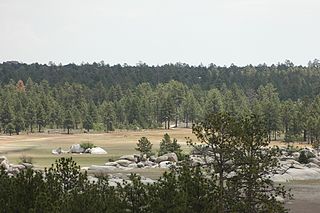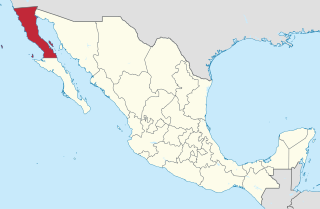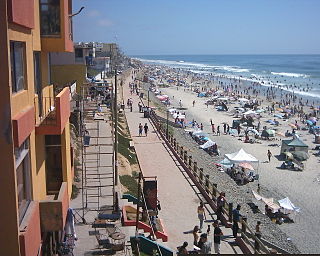Related Research Articles

Tijuana is the most populous city in the state of Baja California, located on the northwestern Pacific Coast of Mexico. Tijuana is the municipal seat of the Tijuana Municipality and the hub of the Tijuana metropolitan area. It has a close proximity to the Mexico–United States border, which is part of the San Diego–Tijuana metro area.

Baja California, officially the Free and Sovereign State of Baja California, is a state in Mexico. It is the northwesternmost of the 32 federal entities of Mexico. Before becoming a state in 1952, the area was known as the North Territory of Baja California. It has an area of 70,113 km2 (27,071 sq mi) and comprises the northern half of the Baja California peninsula, north of the 28th parallel, plus oceanic Guadalupe Island. The mainland portion of the state is bordered on the west by the Pacific Ocean; on the east by Sonora, the U.S. state of Arizona, and the Gulf of California; on the north by the U.S. state of California; and on the south by Baja California Sur.

Mexicali is the capital city of the Mexican state of Baja California. The city, which is the seat of the Mexicali Municipality, has a population of 689,775, according to the 2010 census, while the Calexico–Mexicali metropolitan area is home to 1,000,000 inhabitants on both sides of the Mexico–United States border. Mexicali is a regional economic and cultural hub for the border region of The Californias.

Ensenada ("inlet") is a city in Ensenada Municipality, Baja California, situated on the Pacific Coast of Mexico. Located on Bahía de Todos Santos, the city had a population of 279,765 in 2018, making it the third-largest city in Baja California. The city is an important international trade center and home to the Port of Ensenada, the second-busiest port in Mexico. Ensenada is a major tourist destination, owing to its warm climate and proximity to the Pacific Ocean, and is commonly known as La Cenicienta del Pacífico.

Baja California is a state in Northwest Mexico that is divided into seven municipalities. According to the 2020 Mexican census, Baja California is the 13th most populous state with 3,769,020 inhabitants and the 12th largest by land area spanning 73,290.08 square kilometres (28,297.46 sq mi).

Municipalities are the second-level administrative divisions of Mexico, where the first-level administrative division is the state. They should not be confused with cities or towns that may share the same name as they are distinct entities and do not share geographical boundaries. As of March 2024, there are 2,460 municipalities in Mexico, adding the 16 boroughs of Mexico City to constitute 2476 territorial units.

Ensenada is a municipality in the Mexican state of Baja California. It is the fourth-largest municipality in the country, with a land area of 19,526.8 km2 (7,539.3 sq mi) in 2020, making slightly smaller than the state of Hidalgo and larger than five other Mexican states.

Tijuana Municipality is a municipality in the Mexican state of Baja California. Its municipal seat is located in the city of Tijuana. According to the 2020 census, the municipality had a population of 1,922,523. Montserrat Caballero of the MORENA is the current mayor. The municipality comprises the largest part of the Tijuana metropolitan area.

Playas de Rosarito Municipality is located in the northwestern part of the Mexican state of Baja California comprising part of the Tijuana metropolitan area. It lies just south of the city of Tijuana. Its municipal seat is the city of Rosarito. According to the 2020 census, the municipality had a population of 126,890 inhabitants. Its area is 513.32 km2.
Federal Highway 2 is a free part of the Mexican federal highway corridors that runs along the U.S. border. The highway is in two separate improved segments, starting in the west at Tijuana, Baja California, on the Pacific coast and ending in the east in Matamoros, Tamaulipas, on the Gulf of Mexico. Fed. 2 passes through the border states of Baja California, Sonora, Chihuahua, Coahuila, Nuevo Leon and Tamaulipas. It has a total length of 1,987 kilometres (1,235 mi); 1,343 kilometres (835 mi) in the west and 644 kilometres (400 mi) in the east.
In Mexico, some municipalities and Mexico City are divided into “boroughs” for administrative purposes. Boroughs are known as delegaciones, or in the case of Mexico City, demarcaciones territoriales. Boroughs can either be second-level semi-autonomous administrative divisions or third-level non-autonomous administrative divisions. The limits, nature and competencies of boroughs are usually described in the constitutions of the states they are part of, or in the laws enacted by the municipality itself, and may differ from municipality to municipality.

Playas de Tijuana is the westernmost borough of the municipality of Tijuana, Baja California, stretching from the United States border in the north to Rosarito Beach Municipality in the south. The Bullring by the Sea was opened in 1960.
Operation Tijuana or Operation Baja California of the Government of Mexico is taking place in Tijuana and the surrounding areas of Baja California and Baja California Sur. This operation is part of the Joint Operation Against Drug Trafficking.
Horst Matthai Quelle was a Spanish-speaking German philosopher.
Federal Highway 2D is a part of the federal highways corridors, and is the designation for toll highways paralleling Mexican Federal Highway 2. Seven road segments are designated Highway 2D, all but one in the state of Baja California, providing a toll highway stretching from Tijuana in the west to around Mexicali in the east; one in Sonora, between Santa Ana and Altar; and another between the cities of Matamoros and Reynosa in Tamaulipas.
Same-sex marriage has been legal in Baja California since 3 November 2017 when the Secretary General of Government, Francisco Rueda Gómez, instructed the state's civil registry to immediately begin issuing marriage licenses to same-sex couples and cease enforcement of the state's same-sex marriage ban. This was in line with jurisprudence established by the Mexican Supreme Court, which has ruled that same-sex marriage bans violate Articles 1 and 4 of the Constitution of Mexico. Previously, Baja California had banned same-sex marriage both by statute and in its state constitution.
California Odha Zertuche Díaz (1923–1991) was a Mexican civil engineer and is credited as the primary developer of the drinking water and sewerage system in Ensenada, Mexico.

Marina del Pilar Avila Olmeda is a Mexican lawyer, politician, and member of the National Regeneration Movement (MORENA) political party, currently serving as Governor of Baja California, she is the first woman as governor. She was formerly a Federal Representative for Baja California's 2nd electoral district in the LXIV Legislature in the Chamber of Deputies of the General Congress of the United Mexican States, which she fulfilled from 2018 to 2019, also the first woman as Mayor of Mexicali, from 2019 to 2021.

Alejandra del Carmen León Gastélum is a Mexican politician who is currently Senator from the State of Baja California. She is a member of Morena, having previously served in the Senate as a member of the Labor Party and the Citizens' Movement.
References
- 1 2 "Senadoras de México" (PDF) (in Spanish). Senado de la República. Retrieved 2023-11-04.
- ↑ "Sánchez Díaz: en 89 sí hubo entrega del poder: Martina". afntijuana.info (in Spanish). 2022-10-20. Retrieved 2023-11-04.
- ↑ Montenegro Espinoza, Martina; Mexicali. Ayuntamiento; Instituto de Cultura de Baja California; Universidad Autónoma de Baja California (2004). Mexicali, 100 años y más de 100 mujeres (in Spanish). XVII Ayuntamiento de Mexicali. ISBN 968-6418-32-6. OCLC 57229640 . Retrieved 2023-11-04.
- ↑ "SIL - Sistema de Información Legislativa-PopUp Legislador". sil.gobernacion.gob.mx (in Spanish). Retrieved 2023-11-04.
- ↑ Hernández, Juan Miguel. "Avance de la mujer en la esfera política". El Sol de Tijuana (in Spanish). Retrieved 2023-11-04.
- ↑ "Sesión Extraordinaria de Cabildo del H. Ayuntamiento de Tijuana" (PDF) (in Spanish). 2015-04-17. Retrieved 2023-11-04.
- ↑ "Recordando a Martina Montenegro". La Voz de la Frontera (in Spanish). Retrieved 2023-11-04.
- ↑ "Madrugadores de Playas de Tijuana nombra a Martina Montenegro, Forjadora del Año". Semanario ZETA (in Mexican Spanish). 2018-03-03. Retrieved 2023-11-04.